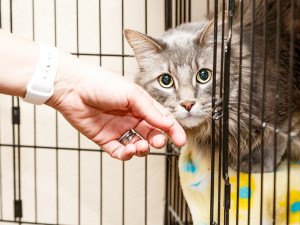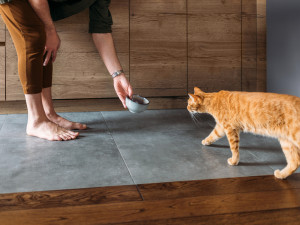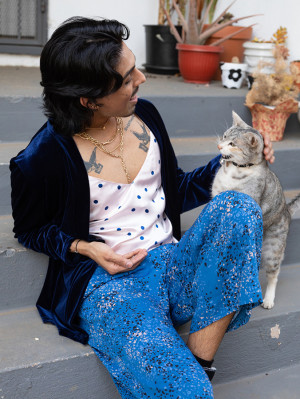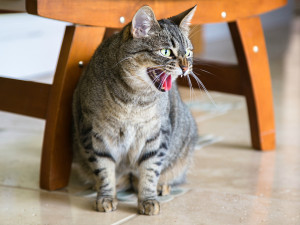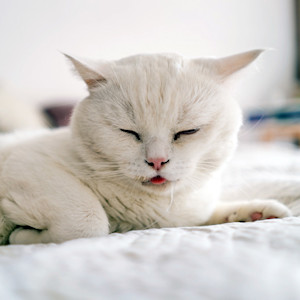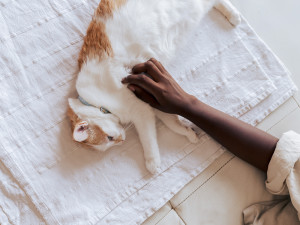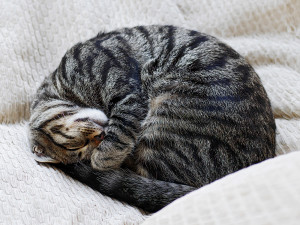6 Common Health Concerns in Senior Cats
How to spot and how to treat them
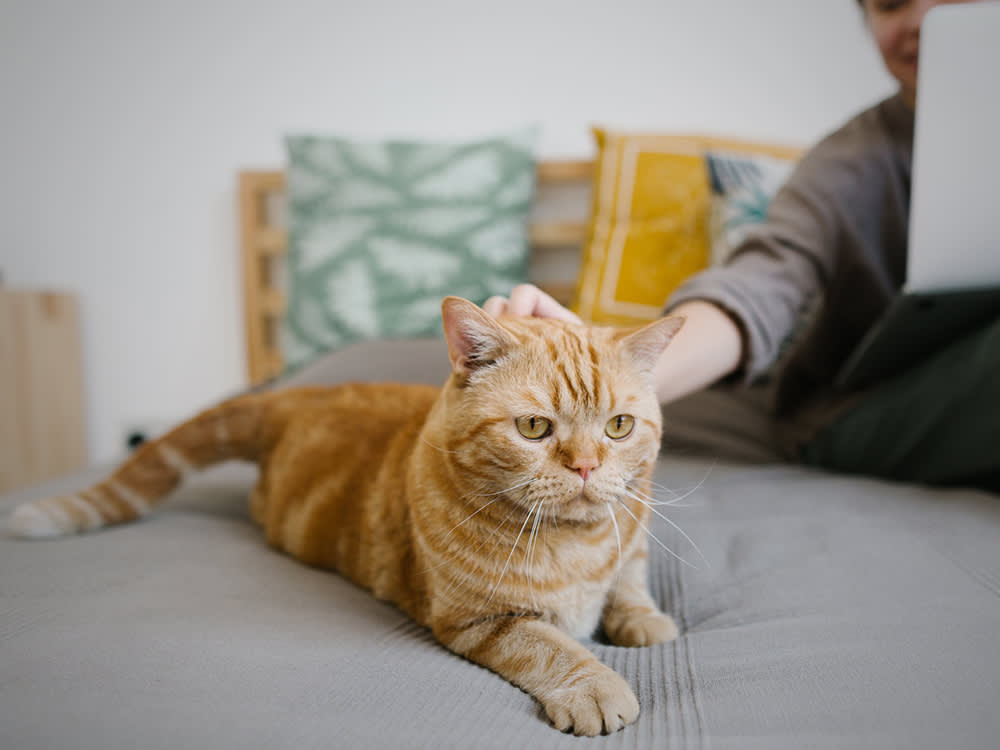
Share Article
Your cat is your baby no matter how old they are, and no one can ever tell you differently. But you can’t ignore the fact that when they get older, you’ll need to pay attention to new health concerns and aches and pains that might pop up for your cat as they enter their silver fox era.
When are cats considered ‘senior’?
Curious if your cat is technically elderly? Advances in veterinary medicine have led to an overall increase in the life expectancy of cats, especially those that receive regular veterinary care. According to Cats Protectionopens in new tab, older cats are classified as mature or middle-aged at 7–10 years old, senior at 11–14 years old, and ‘super senior’ or geriatric cats are 15–25 years old.

Get (totally free) deals for food, treats, accessories, tech and way more pet parenting must-haves.
How do I know if my elderly cat is suffering?
Wondering what old age symptoms are in cats? Here are some of the signs that your cat is getting old. If your cat is exhibiting any of these symptoms, a visit to the vets is recommended as medications are available to help ease them.
One of the most common pain-associated behaviour changes in elderly cats is a decrease in grooming and self-care. Osteoarthritis (OA) is common in cats as they age, and spinal arthritis makes it painful for them to twist so they can groom their body.
If your elderly cat starts missing the litter box or going to the loo elsewhere, that is another common sign that they are in pain. Lower back or hip pain makes getting into and out of the litter box uncomfortable.
Older cats who are in pain may not jump up on furniture anymore or might ask to be lifted up.
Your elderly cat might not want to be picked up or stroked on certain body parts if they are suffering. They also might become aggressive when someone tries to stroke them.
Other signs of painful ageing include lying down to eat or drink, lethargy, excessive licking and loss of interest in toys.
What should I feed my elderly cat?
The nutritional needs of cats change as they age, foods tailored to support the requirements of senior cats are available. Conditions such as diabetes, kidney disease, urinary tract health and thyroid function can affect what your cat needs to eat and in some cases prescription diets are available. Speak to your vet to determine the best diet for your cat’s needs.
Is dry food OK for senior cats?
Cats cope well eating dry food in their senior years, if you notice your cat struggling to eat – at any age – ask your vet to check their mouth for oral problems which may be causing pain. Adding wet food to any cat’s diet is great for hydration, it supports their urinary tract health, is less calorie dense than dry food and provides a tasty, different texture which cats enjoy.
What is the most common illness in older cats?
Let’s review six common diseases affecting senior cats, their symptoms, and some expected diagnostics and treatments for them. If you notice signs of any of the following in your cat, we advise a trip to the vet for a health check.
1. Chronic kidney disease
Chronic kidney disease (CKD) is one of the most commonly diagnosed diseases in senior cats. The kidneys are responsible for eliminating waste products, balancing the body’s water content and releasing hormones that control blood pressure, calcium levels and red blood cell production. Kidney function often decreases with age, leading to dehydration, the build-up of waste products, urine changes, high blood pressure and anaemia.
Symptoms of CKD in cats include increased urination, increased water intake, vomiting, decreased appetite and weight loss. Cats with CKD have trouble maintaining hydration, so increased urination and thirst are often early signs of this disease. Vomiting or decreased appetite may indicate a sudden increase in kidney enzymes. CKD causes weight loss due to reduced muscle mass and fat stores.
Blood work, urinalysis and blood pressure checks are used to diagnose chronic kidney disease and determine the stage of the disease. An ultrasound of the kidneys may be useful in differentiating CKD from other causes of kidney problems. CKD is managed, not cured, so treatment may include diet, fluid therapy or medications, depending on the severity of the disease.
2. Hyperthyroid disease
We’ve all seen the cranky, skinny old cat. While some of these slender cats are just asserting their dominance over humans by being crabby, others have underlying disease. Thyroid hormones help regulate body temperature, metabolism and behaviour. Hyperthyroid disease involves an overproduction of these thyroid hormones, leading to rapid metabolism, increased hunger, high blood pressure and behavioural changes.
Symptoms of hyperthyroid disease include weight loss (despite a healthy appetite), vomiting, and changes to behaviour like hyperactivity and aggression. Feline hyperthyroid disease is diagnosed by a thorough physical exam (checking for enlarged thyroid glands) and blood work. Once confirmed, additional tests are often recommended to rule out secondary issues such as kidney or heart disease.
Treatment involves regulating thyroid hormone production with medication, diet, radiation treatment or surgery. Depending on the chosen therapeutic option, treatment may be long-term management or a one-time procedure.
3. Diabetes mellitus
Older, overweight cats are at increased risk of developing diabetes mellitus. Diabetes mellitus occurs when the body’s blood sugar levels are abnormal due to either a lack of insulin production (Type I) or an inappropriate response to insulin (Type II). Cats are more likely to be diagnosed with Type II diabetes. Symptoms of diabetes mellitus include increased thirst, increased urination, poor appetite, vomiting and weight loss. Diabetes mellitus is diagnosed with blood work and a urinalysis.
Treatment involves dietary restrictions and insulin injections – often twice daily. Regular blood sugar checks are needed to ensure the insulin dose does not need to be adjusted. Cats with Type II diabetes mellitus can go into remission with proper treatment. Remission of disease has been reported in approximately 30 percent of cases with treatment, so early diagnosis and appropriate treatment can make a big impact.
4. Arthritis
Senior cats may become less active with age, as cartilage wears thin, leading to joint inflammation and pain. Some of this may be due to a well-developed indifference to their surroundings, but sometimes it is due to underlying joint pain.
Symptoms of arthritis in cats include limping, reluctance to jump, stiff gait and decreased activity. Radiographs are used to identify arthritic joints – hips, elbows and knees are common sites of feline arthritis. Treatment involves pain control, weight management and environmental changes like pet stairs and low-walled litter boxes.
5. Dental disease
Cats commonly develop dental disease as they age. Feline dental disease can vary in severity from plaque build-up to tooth resorption. Untreated dental disease leads to oral pain and increased risk of infection.
Signs of dental disease can be hard to spot, cats are stoic animals and masters of hiding pain so look out for any reluctance to let you stroke their head or face, bad breath, differences in drooling, being withdrawn, pawing at their mouth or rubbing their face on furniture. If you notice any of these symptoms, call your vet for a check-up.
Dental disease is diagnosed with a thorough physical exam and dental radiographs. Treatment involves dental cleanings, extractions (tooth removal) when indicated and treating underlying infections. After treatment, initiating a daily oral care regime such as toothbrushing or scientifically proven daily dental treats for cats is recommended to help prevent the need for further treatment.
6. Cancer
An unfortunate truth is that the risk of cats developing cancer increases as they get older. Common cancers seen in cats include lymphoma, squamous cell sarcoma, and mammary tumours. Symptoms seen in cats with cancer include poor appetite, lethargy, weight loss, laboured breathing, changes to the skin or fur loss. However, symptoms can vary widely, so regular check-ups are essential for early detection.
Diagnosis is dependent on the type and location of the disease, but blood work, radiographs, ultrasound and cytology are commonly used tools. Treatment options vary by diagnosis, but your veterinarian can talk you through all available options.
Frequently asked questions
1. What are the signs of illness in older cats?
Signs of illness include decrease in grooming, not using the litter box, pain when trying to jump on things, loss of interest in being stroked or playing with toys.
2. What is the most common disease in older cats?
The most common diseases in older cats are chronic kidney disease, diabetes, hyperthyroid disease, arthritis, dental disease and cancer.
3. Why do older cats stop drinking water?
Cats with health issues such as kidney disease, cancer, diabetes or hyperthyroidism are likely to be drinking more because of their condition. When they’ve started treatment, the medication may reduce their excessive thirst back to normal levels. They are however, at greater risk of dehydration so measuring how much water they drink in a day will helps you to monitor it. In hot weather this is particularly important and if you are concerned at all, just call your vet for advice.
A healthy senior cat will benefit from having wet food added to their daily diet as the natural moisture content of the food helps maintain their hydration levels if they are not drinking as much water as they normally would.
4. When should I be concerned about my elderly cat?
If your elderly cat appears to be in pain or their eating and drinking habits change, you should take them to the vet because they may have a health condition.
5. How do you keep senior cats healthy?
Make sure your senior cat stays healthy by taking them to regular vet visits, monitoring their behaviour, eating and drinking, helping them groom, and eliminating stress.
6. What are the options for managing health problems in senior cats?
Feeding your senior cat a healthy diet is one of the main ways to manage health problems. Take your cat for regular health checks with their vet and follow their advice for treating the condition at home. Other ways to help your senior cat feel well include:
Maintaining movement and exercise in the home through games and interaction.
A comfortable padded bed to support their joints, in a draught-free, quiet area of the home.
Cats love to be well-groomed so a good brush regularly and a damp face cloth wiped over their eyes and face can contribute to their sense of well-being.
Puzzle feeders dispensing treats can be good to help their mental well-being.
Keep up to date with their vaccinations, flea and worm prevention treatments.
Plenty of attention, cuddles and tender, loving care.
7. What are the best things for senior cats?
Take them for regular vet visits, feed them a healthy diet, pay attention to their behaviour, and learn the common signs of pain and sickness.
References
Subclinical bacteriuria in a mixed population of 179 middle-aged and elderly catsopens in new tab
American Association of Feline Practitioners Senior Care Guidelinesopens in new tab
What to Expect When Your Kitty Becomes a Senior Catopens in new tab
How to Recognize Pain in Aging Catopens in new tabsopens in new tab

Dr. Alycia Washington, DVM, MS
Alycia Washington, DVM, is a small animal emergency veterinarian with over ten years of experience based in North Carolina. She works as a relief veterinarianopens in new tab and provides services to numerous emergency and specialty hospitals. She also works as a veterinary writer with a focus on educating pet owners, and is the author, under the name A. C. Washington, of the children’s book Dr. Jett, Monster Vet.
Related articles
![Curled up tabby cat sleeping on pillows]()
How Many Cat Naps Is Too Many?
A very sleepy kitty isn’t usually a problem, but watch out for these signs of medical distress
![Profile view of a man giving a cat food to eat]()
Why Is My New Cat Not Eating?
A veterinary nutritionist explains the causes, signs and treatment for how to increase their appetite
![cat hissing under chair]()
Cat Hissing: Fair Warning or Fighting Words?
Your cat’s hissy fit could mean ‘Don’t test me’ or ‘Let’s do this’. It’s best not to call their bluff
